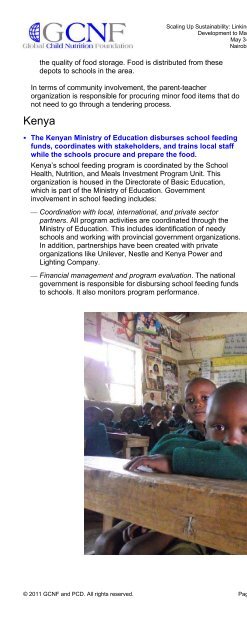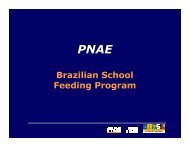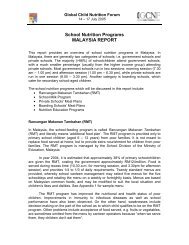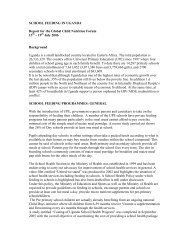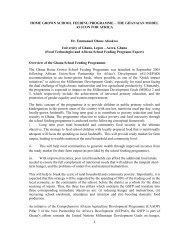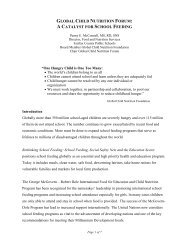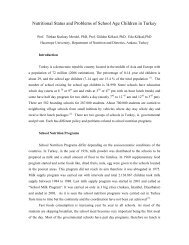EXECUTIVE SUMMARY - Global Child Nutrition Foundation
EXECUTIVE SUMMARY - Global Child Nutrition Foundation
EXECUTIVE SUMMARY - Global Child Nutrition Foundation
You also want an ePaper? Increase the reach of your titles
YUMPU automatically turns print PDFs into web optimized ePapers that Google loves.
the quality of food storage. Food is distributed from these<br />
depots to schools in the area.<br />
In terms of community involvement, the parent-teacher<br />
organization is responsible for procuring minor food items that do<br />
not need to go through a tendering process.<br />
Kenya<br />
The Kenyan Ministry of Education disburses school feeding<br />
funds, coordinates with stakeholders, and trains local staff<br />
while the schools procure and prepare the food.<br />
Kenya’s school feeding program is coordinated by the School<br />
Health, <strong>Nutrition</strong>, and Meals Investment Program Unit. This<br />
organization is housed in the Directorate of Basic Education,<br />
which is part of the Ministry of Education. Government<br />
involvement in school feeding includes:<br />
Coordination with local, international, and private sector<br />
partners. All program activities are coordinated through the<br />
Ministry of Education. This includes identification of needy<br />
schools and working with provincial government organizations.<br />
In addition, partnerships have been created with private<br />
organizations like Unilever, Nestle and Kenya Power and<br />
Lighting Company.<br />
Financial management and program evaluation. The national<br />
government is responsible for disbursing school feeding funds<br />
to schools. It also monitors program performance.<br />
Scaling Up Sustainability: Linking School Feeding with Agriculture<br />
Development to Maximize Food Security<br />
May 3-7, 2011<br />
Nairobi, Kenya<br />
© 2011 GCNF and PCD. All rights reserved. Page 28<br />
Training local staff. The national government has district field<br />
officers that train school management committees on food<br />
procurement and hygiene.<br />
In addition to the Ministry of Education’s school feeding initiative,<br />
other programs exist. The Ministry of Agriculture administers a<br />
school feeding program which involves strong community<br />
engagement.<br />
Senegal<br />
In Senegal, more local resources are needed to augment<br />
government support of the school feeding program.<br />
Senegal views school feeding programs as one way to achieve<br />
the Millennium Development Goals. After the president declared<br />
his support for the program in 2007, a school cafeteria<br />
management structure was implemented. In addition, tools and<br />
information systems were developed for program management.<br />
One challenge is that partners finance 80% of the program, with<br />
the government financing the remaining 20%. Local resources<br />
must be mobilized to increase the financing generated locally.<br />
Increased participation by the private sector and households is<br />
necessary. A dairy producer in Dakar, for example, has started<br />
contributing milk. In the agricultural sector, technology must be<br />
used to help farmers increase their productivity.


